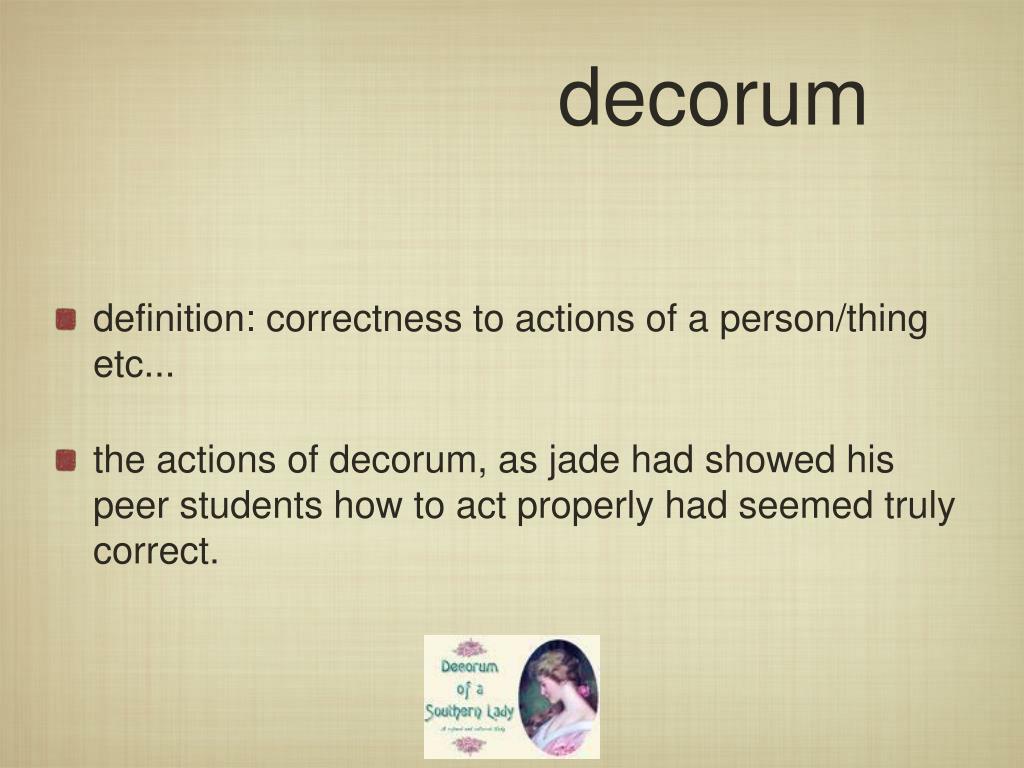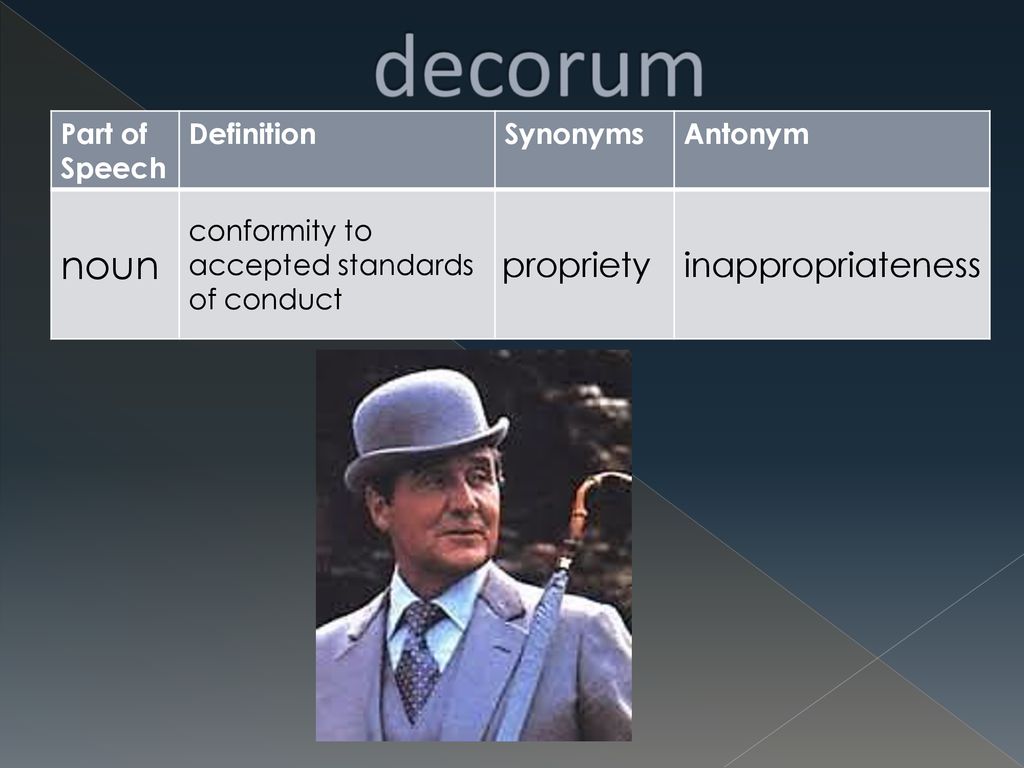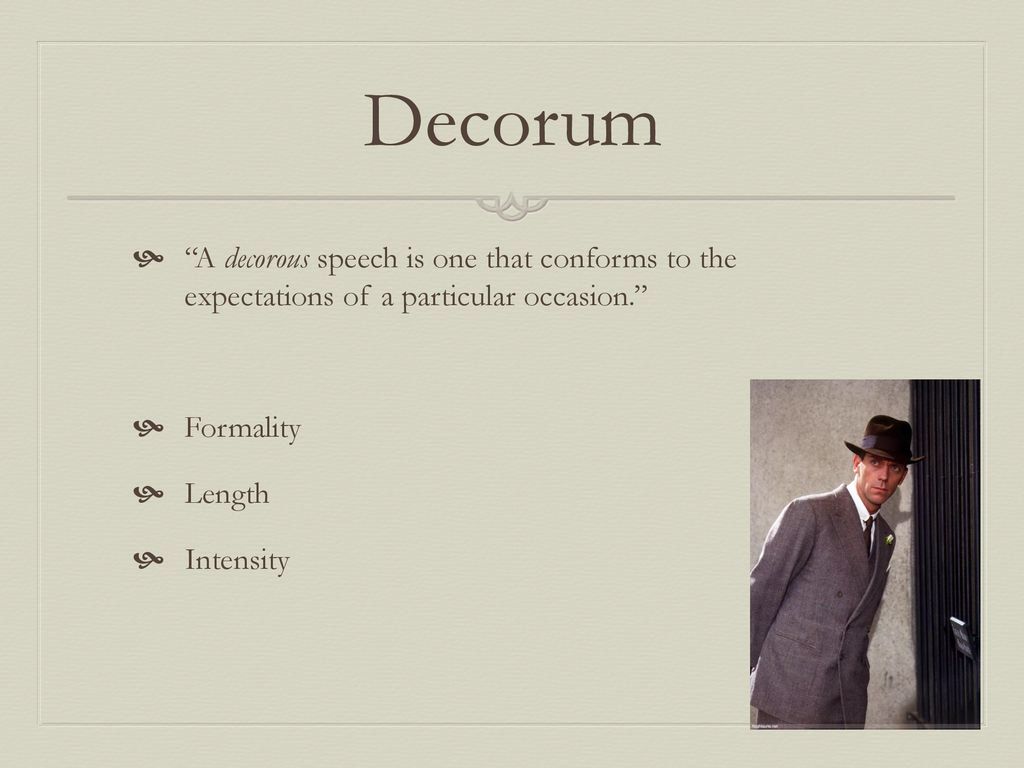Decorum Meaning - Understanding Proper Behavior
Ever wonder what makes some interactions feel just right, while others seem a bit off? It's almost like there's an unspoken script for how we act in different situations, a kind of invisible guide that helps things run smoothly. This sense of what's suitable, what fits the moment, is really what we're talking about when we bring up decorum. It's about finding that sweet spot where our actions match the setting, making everyone feel more at ease.
You know, it's pretty interesting how this idea pops up everywhere, from a quiet library to a lively gathering. Decorum isn't just about being polite; it's about showing respect for the situation and the people around you, too. It’s that quiet understanding of what's expected, what keeps things orderly and pleasant for everyone involved, so.
Whether you're at a formal dinner or just hanging out with friends, having a grasp of decorum can actually make a big difference in how you connect with others. It helps build good feelings and makes interactions a whole lot better, really. So, let's explore what this idea of decorum truly means, and how it shapes our everyday experiences, in a way.
Table of Contents
- What is Decorum Meaning?
- Where Does Decorum Meaning Come From?
- How Does Decorum Meaning Show Up in Daily Life?
- Decorum Meaning in Different Settings
- What Happens Without Decorum Meaning?
- Why is Decorum Meaning Still Important Today?
What is Decorum Meaning?
When we talk about decorum, we're basically referring to behavior that is kept in check, calm, and shows good manners. It's about the way someone conducts themselves, making sure their actions fit the setting they are in, you know. Think of it as a quality or a state of being proper, where someone displays a dignified kind of suitability. It's the idea that there's a right way to act in certain situations, and following that path makes things go more smoothly for everyone, so.
This concept of decorum also touches upon what's considered suitable in creative works, like plays or books. For instance, the tone or the style of a piece of writing should match its particular situation or the overall message it's trying to get across. It’s about the fitness of a style to a subject, making sure everything feels consistent and right for the piece, too. This means that a serious story might not have a silly tone, because that wouldn't show much decorum in its presentation, basically.
Decorum is also understood as an observance or a requirement of polite society. These are the generally accepted rules for how people should behave when they are together. It's about respecting these established ways of doing things and the common standards that most people agree upon. So, it's not just about what feels right to one person, but what a group of people generally considers correct and respectful, that is.
In simple terms, decorum describes proper and polite behavior. It's about the appropriateness of how someone acts or conducts themselves. This means knowing what kind of actions are expected in different places and with different people, and then choosing to act in that way. It's about showing that you understand the social rules and are willing to follow them, which is pretty important for getting along, anyway.
Where Does Decorum Meaning Come From?
The idea of decorum has quite a long history, stretching back to classical times. It was a key principle in how people thought about public speaking, writing, and even plays. In those days, it was all about making sure that the style you used, whether in a speech or a poem, was just right for the subject you were talking about, or the character you were portraying, you know. So, if a character was supposed to be a serious king, their words and actions would need to match that seriousness, rather than being silly or out of place.
This principle meant that there was a strong connection between what was being said or shown and how it was being said or shown. It wasn't just about good manners in everyday life, but about the fitness of an artistic element to its particular circumstances. For example, a sad scene in a play would use language and movements that fit the sadness, not something that would make people laugh. This ensured that the work felt cohesive and had a sense of its own internal logic, in a way.
Over time, the idea of decorum broadened from just artistic and literary works to include how people act in society. It became about behavior that people generally consider to be correct, polite, and worthy of respect. This shift meant that the concept started to apply to our daily interactions, guiding how we treat others and how we present ourselves in public, too. It's like the idea of suitability moved from the stage to the street, basically.
So, the roots of decorum are deeply tied to the idea of appropriateness and fitness, whether that's in the way a story is told or how a person carries themselves. It’s about matching your actions, words, or creative choices to the situation at hand, making sure everything feels in harmony. This long-standing notion has helped shape our collective sense of what is proper and fitting in many different parts of life, still.
How Does Decorum Meaning Show Up in Daily Life?
Decorum, in its most common sense, shows up in our daily lives as behavior that is kept in check, calm, and shows good manners. It's about the kind of conduct that people generally expect to see in various social situations. For instance, when you're at a nice dinner gathering, people expect you to eat with a certain level of care and consideration for others at the table. This means not making loud noises or acting in ways that might disturb those around you, you know.
A very clear example of not showing decorum is something like letting out a very loud belch at a fancy dinner gathering. This action goes against the generally accepted ways of behaving in such a setting. It's not just about being impolite; it's about failing to recognize the specific expectations for that particular environment. Such an action can make others feel uncomfortable and shows a lack of respect for the occasion and the people present, too.
Another way decorum appears in our daily routines is through what's called "court decorum." This refers to the proper behavior expected in a courtroom. For example, it’s a requirement that everyone in a courtroom addresses the judge as “your honor.” This specific way of speaking is not just a polite gesture; it’s a standard way of showing respect for the authority of the court and the person presiding over it. It keeps the proceedings orderly and ensures that the serious nature of the setting is maintained, that is.
So, whether it's about how you eat at a meal or how you speak in a serious place, decorum is about understanding and following the unwritten rules that help society function smoothly. It's about knowing what actions are considered right and proper for a given situation, and then choosing to act in a way that fits. This helps everyone feel more comfortable and respected, pretty much, and makes our interactions more pleasant overall, basically.
Decorum Meaning in Different Settings
The idea of decorum isn't a one-size-fits-all kind of thing; it changes depending on where you are and what you're doing. What's considered proper in one place might be totally out of place in another. It's about the suitability of behavior or actions to the specific surroundings. This means that understanding decorum involves being able to read a situation and adjust your conduct accordingly, so.
For example, the way you might chat with a close friend is very different from how you would speak to a new boss. Both situations require some form of appropriate behavior, but the specific details of that behavior shift. This adaptability is key to having good decorum. It’s about showing that you grasp the unspoken rules that govern different social spaces, which is quite important for getting along well with others, too.
So, let's take a closer look at how the idea of decorum changes across various parts of our lives, from hanging out with people to working, and even in creative works. It’s pretty interesting how these different settings shape what we consider to be fitting and respectful, in a way. Each place has its own set of expectations, and knowing them helps us fit in and show proper consideration, really.
Decorum Meaning in Social Gatherings
When you're at a social gathering, like a birthday party or a dinner at someone's house, decorum means acting in a way that is controlled, calm, and shows good manners. It's about making sure your behavior contributes to a pleasant atmosphere for everyone present, you know. This could involve simple things like waiting your turn to speak, not interrupting others, or using polite words when you talk. It's about being considerate of the people around you, so.
The concept of decorum in these settings is really about the appropriateness of your conduct. For instance, if you're at a quiet gathering, speaking in a very loud voice might not show much decorum. Similarly, if you're a guest in someone's home, it's generally expected that you show respect for their belongings and their space. These are the kinds of unstated agreements that help social events feel comfortable and enjoyable for all involved, too.
It also involves respecting the established ways of doing things within that particular social group or setting. Some families might have certain customs at meal times, for example, and showing decorum would mean trying to follow those customs as best you can. It's about showing that you understand the social norms and are willing to fit in, which helps build a sense of ease and connection among people, pretty much.
Essentially, in social settings, decorum is about being a considerate and respectful participant. It's about understanding what behavior is considered correct and polite within that specific group, and then choosing to act in a way that reflects that understanding. This helps avoid awkward moments and makes interactions much smoother, basically, allowing everyone to feel more at ease, that is.
Decorum Meaning in Professional Places
In professional places, like an office, a meeting, or a job interview, decorum takes on a slightly different shape. Here, it’s about behavior that is controlled, calm, and shows respect for the work environment and the people in it. It means conducting yourself in a way that reflects seriousness and professionalism, you know. This could involve how you dress, how you speak to colleagues and superiors, and how you handle work-related discussions, so.
The appropriateness of your conduct is very important in these settings. For example, speaking about personal matters too loudly in an open office space might not show much decorum, as it could disturb others who are trying to concentrate. Similarly, arriving late to meetings repeatedly or using very casual language in formal communications could be seen as a lack of proper professional behavior, too.
Decorum in a professional setting also means observing the requirements of that particular workplace. Every company or organization has its own set of expectations for how people should act. This might include specific ways of addressing clients, how to conduct yourself during presentations, or even how to manage disagreements with co-workers. It's about respecting these established ways of working and upholding the standards of the place, that is.
So, in professional places, decorum is about showing that you take your work seriously and respect the people you work with. It's about understanding what is considered proper and polite behavior within that specific professional setting, and then acting in a way that supports a productive and respectful atmosphere. This helps build trust and makes the workplace a more effective place for everyone, pretty much.
Decorum Meaning in Artistic Works
Beyond how people act, decorum also has a very specific meaning in the world of artistic and literary works. Here, it’s about the suitability of an element within a piece of art to its particular circumstances or to the whole composition. It means that the style, the tone, or even the language used in a play, a poem, or a story should fit the subject matter and the overall message the artist is trying to convey, you know.
For instance, if a writer is creating a very serious and dramatic story, the decorum principle would suggest that the language used should be equally serious and not include silly jokes or overly casual expressions. The appropriateness of the style to the subject is key. It’s about making sure that all the parts of the artistic work feel consistent and work together to create the intended effect, so. A sad scene, for example, would have a sad tone and not a cheerful one, basically.
This idea of decorum was a core principle in classical rhetoric and theatrical theory. It concerned whether a certain style was fitting or not for a particular subject. It helped guide artists in making choices that would make their work feel right and proper for its audience. It’s about ensuring that the artistic choices made support the overall purpose and meaning of the piece, too. This helps the audience connect with the work in the way the artist intended, in a way.
So, in artistic works, decorum is about the harmony and fitness of all the different elements. It's about ensuring that the tone, style, and content are all aligned with the overall message and purpose of the creation. This careful attention to suitability helps make the artistic work feel complete and well-thought-out, allowing it to have a stronger impact on those who experience it, pretty much, that is.
What Happens Without Decorum Meaning?
When there's a lack of decorum, things can get a bit messy and uncomfortable, you know. Without that sense of proper and polite behavior, interactions can feel awkward or even disrespectful. It's like everyone is playing by their own rules, and there's no shared understanding of what's expected. This can lead to misunderstandings and a general feeling of unease among people, so.
Think back to the example of letting out a very loud belch at a fancy dinner gathering. This act clearly shows a lack of decorum. The immediate effect is often discomfort for those around you. It breaks the unspoken agreement about how people should behave in that setting, making the atmosphere less pleasant for everyone. It shows that the person doing it doesn't quite grasp the importance of fitting in with the social expectations of the moment, basically.
In more formal places, like a courtroom, a lack of decorum can have even more serious effects. If people don't address the judge with proper respect, or if they act out in ways that are not calm and controlled, it can disrupt the entire process. This kind of behavior can undermine the seriousness of the proceedings and make it harder for justice to be carried out. It’s pretty important that everyone follows the rules in such settings, too.
So, without decorum, whether in a social setting or a professional one, the common standards of behavior are ignored. This can lead to a breakdown in how people relate to each other, making it harder to communicate effectively and respectfully. It’s about more than just being polite; it’s about maintaining order and ensuring that interactions are constructive and considerate for everyone involved, that is, pretty much.
Why is Decorum Meaning Still Important Today?
Even in our very fast-paced world, the idea of decorum still holds a lot of weight. It’s about behavior that people consider to be correct, polite, and worthy of respect, and these qualities remain very important for getting along well with others, you know. Decorum helps create a sense of order and predictability in our interactions, making social situations much smoother and more pleasant for everyone involved, so.
It’s not just about following old-fashioned rules; it’s about showing consideration and respect for the people around us. When we act with decorum, we are essentially communicating that we value the situation and the individuals present. This helps build stronger connections and fosters a sense of mutual respect, which is quite important for any healthy relationship, whether personal or professional, too.
Decorum helps us adjust our actions to fit different environments, which is a very useful skill. Knowing how to behave appropriately in a formal meeting versus a casual get-together shows a kind of social intelligence. This adaptability allows us to move through different parts of our lives with greater ease and confidence, helping us to make good impressions and avoid awkward moments, basically.
So, understanding and practicing decorum means having a better grasp of the unspoken rules that govern our daily lives. It allows us to contribute to a more harmonious and respectful society, where interactions are generally positive and productive. It’s about making sure our conduct aligns with what’s considered proper, which helps everyone feel more comfortable and valued, pretty much, that is.

PPT - Adversity PowerPoint Presentation, free download - ID:6956948

Decorum Synonym Meaning | Review Home Decor

Speaking on Special Occasions - ppt download